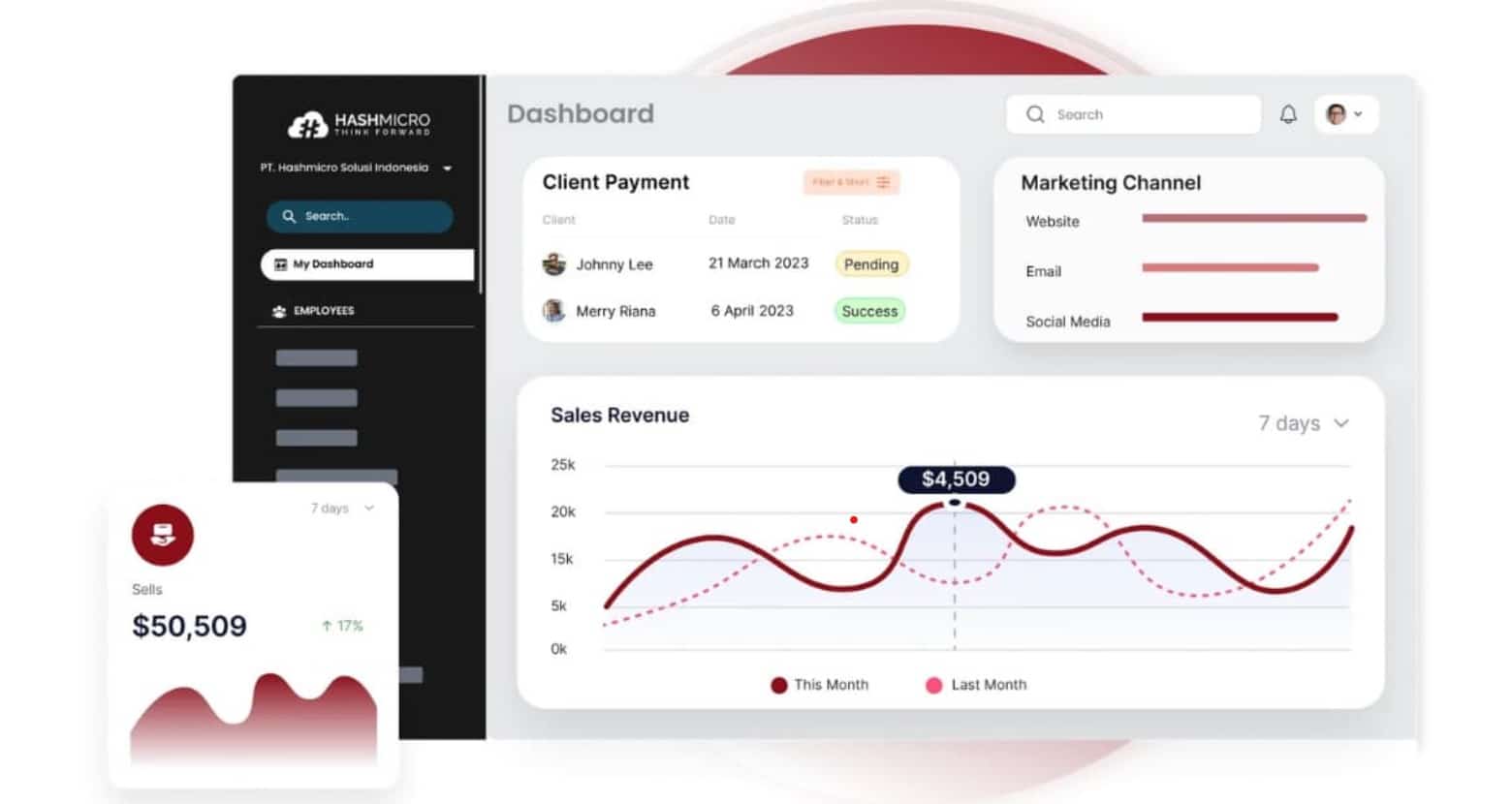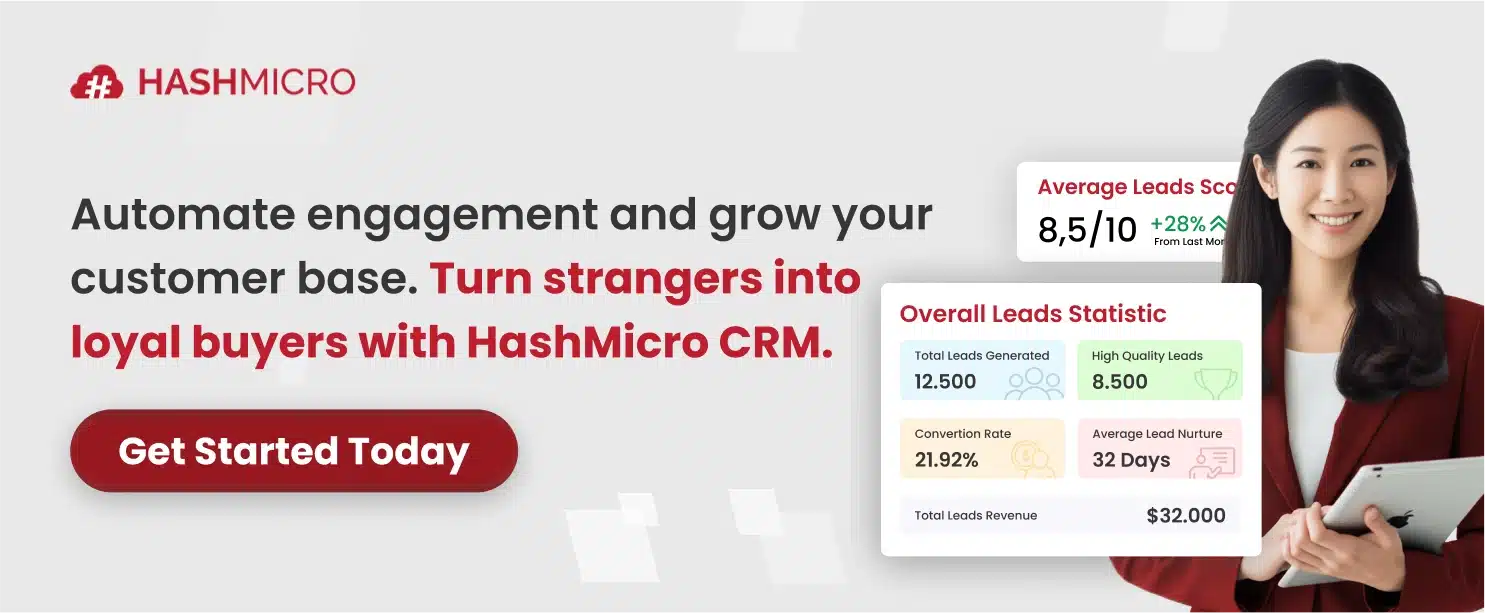Are you tired of chasing leads that don’t convert? AI lead scoring uses machine learning to rank prospects by their likelihood of conversion, analyzing their interactions, demographics, and behavior. This helps you focus on high-value leads, boosting sales efficiency.
In fact, 65% of businesses worldwide have adopted CRM systems with AI capabilities, improving customer interactions with tools like predictive analytics and chatbots. HashMicro CRM integrates AI-powered lead scoring to automatically assign scores, so your sales team can engage the most promising prospects.
Want to see how it works? Try our free demo and discover how HashMicro can optimize your sales with AI-driven lead prioritization!
Key Takeaways
|
What is AI Lead Scoring?
AI lead scoring is a machine learning-based method that ranks leads based on their likelihood to convert. It analyzes customer data, behavior, and engagement patterns to help businesses efficiently prioritize high-potential prospects.
By using AI, businesses can eliminate guesswork and focus on high-quality leads most likely to convert. AI lead scoring models continuously learn from new data, adjusting lead scores dynamically based on customer behavior.
Implementing AI lead scoring helps companies optimize their sales funnel by reducing time wasted on low-potential leads. Studies show that businesses using AI-driven scoring experience higher conversion rates and increased sales productivity.
With automation and data-driven insights, AI lead scoring has become a crucial tool for modern companies aiming for sales efficiency.
What are the Benefits of AI Lead Scoring?
AI lead scoring has transformed the way businesses identify and prioritize potential customers. Here are the key benefits of AI lead scoring and how it can optimize your sales strategy:
1. Increased sales efficiency
AI based lead scoring helps sales teams focus on high-potential leads, reducing time wasted on unqualified prospects. By leveraging machine learning, businesses can automate lead prioritization, ensuring that sales efforts are directed toward the most promising opportunities.
2. Improved conversion rates
With AI-driven insights, businesses can engage with leads at the right time and with the right approach. Predictive analytics identify patterns in customer behavior, allowing sales teams to personalize interactions and increase the chances of conversion.
3. Data-driven decision making
Lead scoring AI eliminates the guesswork in lead qualification, providing objective and data-backed insights. It continuously learns from customer interactions and market trends, ensuring that businesses always have accurate and up-to-date lead scores.
4. Better marketing and sales alignment
AI-driven lead scoring bridges the gap between marketing and sales teams by providing a clear, unified lead qualification process. Marketing teams can generate leads that align with sales priorities, while sales teams receive high-quality prospects ready for conversion.
5. Scalability and adaptability
Unlike traditional lead scoring, AI models scale effortlessly as a business grows. They adapt to new data, evolve market trends, and change customer behaviors, ensuring long-term accuracy and relevance.
How AI Lead Scoring Works
AI lead scoring employs machine learning algorithms to evaluate and rank leads based on their likelihood of converting into customers. The process involves several key steps:
1. Data aggregation from diverse sources
AI systems collect extensive data from various channels, including CRM platforms, website analytics, email marketing tools, and social media interactions. This comprehensive data collection ensures a holistic view of each lead’s profile and behavior.
2. Data cleansing and feature engineering
After collection, the data undergoes cleansing to eliminate inaccuracies and duplicates. Feature engineering is then applied to transform raw data into meaningful metrics, such as engagement scores, enhancing the predictive power of the AI models.
3. Model training with historical data
Machine learning models are trained using historical lead data, learning patterns and attributes associated with successful conversions. This training enables the AI to identify key indicators of lead quality.
4. Real-time lead scoring and prioritization
Once trained, the AI assigns scores to incoming leads in real time, reflecting their conversion potential. Sales teams can then prioritize leads with higher scores, focusing efforts where they are most likely to yield results.
5. Continuous learning and model refinement
AI models continuously learn from new data and outcomes, refining their predictions. This ongoing learning process ensures that lead scoring adapts to evolving market trends and customer behaviors, maintaining accuracy and relevance.
Lead generation attracts potential customers, but that interest can quickly fade without an effective lead capture process. Lead capture helps you gather key information, enabling better engagement and increasing the chances of converting prospects into paying customers.
Traditional Lead Scoring vs. AI Lead Scoring
Lead scoring is crucial for identifying high-potential leads, but traditional and AI-driven approaches differ significantly. While traditional lead scoring relies on static criteria, AI lead scoring leverages machine learning for dynamic and data-driven insights.
Understanding these differences helps businesses optimize their sales strategies.
1. Traditional lead scoring
Traditional lead scoring assigns values to leads based on predefined rules, such as demographics, job titles, or past interactions. Marketing and sales teams manually set these rules using a point-based system.
While effective for basic lead qualification, this method is limited by human bias and static parameters. One major drawback is that traditional scoring does not adapt to changing customer behaviours.
Since scoring rules remain fixed, businesses may miss emerging patterns or new customer trends. This results in inconsistent lead prioritization and missed sales opportunities.
2. AI lead scoring
AI lead scoring eliminates manual guesswork using machine learning algorithms to analyze vast customer data. It learns from behavioral trends, purchase history, and engagement patterns to adjust lead scores dynamically.
This ensures higher accuracy and better lead prioritization. Unlike traditional methods, AI lead scoring identifies hidden correlations that humans might overlook. It adapts to market changes, optimizing sales efforts in real-time.
By automating the scoring process, AI helps businesses increase conversions, reduce sales cycle time, and improve overall efficiency.
|
Hashy AI Fact

Need to Know
Hashy AI for Leads helps businesses capture, qualify, and convert leads more effectively. With smart lead scoring, automated follow-ups, and real-time analytics, it increases conversion rates and keeps your pipeline flowing.
Request a free demo today!
Best Practices for Implementing AI Lead Scoring
Successfully implementing AI lead scoring requires a strategic approach to maximize its effectiveness. Here are key steps to ensure a smooth implementation:
1. Integrate AI with your CRM and marketing tools
For AI lead scoring to work efficiently, it must be integrated with your CRM system and marketing automation tools. This ensures seamless data collection from various customer touchpoints, allowing AI to analyze engagement patterns and assign accurate lead scores.
By leveraging Hashy AI’s advanced algorithms, companies can prioritize high-intent prospects while maintaining a customer-centric approach, ultimately increasing conversion rates without aggressive sales tactics.
2. Use high-quality and relevant data
AI models rely on historical and real-time data to make accurate predictions. Ensure your data sources include customer interactions, purchase history, and behavioral insights. Regularly clean and update your database to prevent outdated or inaccurate information from affecting the scoring process.
3. Define clear lead qualification criteria
While AI automated lead scoring, businesses must still establish key indicators of a high-quality lead. Identify attributes such as industry, company size, engagement levels, and past buying behavior to help AI refine its scoring model and align with sales objectives.
4. Continuously monitor and optimize performance
AI lead scoring models improve over time, but continuous monitoring is essential. Regularly assess the effectiveness of your scoring system by comparing AI-generated scores with actual conversion rates. Adjust parameters if necessary to enhance accuracy and business impact.
5. Align sales and marketing teams
To maximize AI lead-scoring benefits, sales and marketing teams must work together. Ensure both teams understand how AI assigns scores and establish a clear handoff process for high-priority leads. Effective communication between departments leads to better lead nurturing and higher conversions.
6. Test and refine the model over time
AI models require constant learning and refinement to stay effective. Run A/B tests on different lead scoring strategies, analyze results, and fine-tune the system based on performance insights. This helps maintain high accuracy and relevance as customer behaviors evolve.
By following these best practices, businesses can ensure that AI lead scoring enhances lead qualification, streamlines the sales process, and drives sustainable revenue growth.
Boost Conversions with AI Lead Scoring in HashMicro CRM
HashMicro CRM leverages AI-driven lead scoring to help businesses identify and prioritize high-potential leads more effectively. Analyzing customer behavior, engagement, and historical data allows sales teams to focus on the most promising prospects.
With seamless integration across sales and marketing workflows, HashMicro CRM enables real-time lead segmentation based on AI-driven scores. This ensures that marketing teams can nurture potential customers while sales teams concentrate on qualified leads, improving collaboration and efficiency.
Here are the key features of HashMicro CRM that enhance lead management, streamline sales processes, and improve overall business efficiency.
- Hashy AI: AI-powered automation that optimizes lead scoring, sales predictions, and customer insights for smarter decision-making.
- Leads – Hash Quality Score: AI-driven lead scoring system that ranks prospects based on engagement, behavior, and conversion potential.
- KPI for Activity Targeting: Tracks key sales performance metrics to ensure teams meet activity targets and improve productivity.
- CRM Mobile Apps – Android & iOS: Access and manage CRM data on the go with fully functional mobile apps for Android and iOS.
- Sales Pipeline Management: Visualize and track deals at every stage, ensuring a structured and efficient sales process.
- Sales Report Generation: Automates sales data analysis, providing detailed reports for performance evaluation and forecasting.
Conclusions
AI lead scoring revolutionizes how businesses identify and prioritize potential customers by leveraging data-driven insights and automation. Focusing on high-potential prospects enhances lead qualification accuracy, improves sales efficiency, and maximizes conversion rates.
With improved decision-making, seamless integration with sales workflows, and real-time insights, AI lead scoring helps businesses optimize customer acquisition strategies. It eliminates guesswork, ensuring sales teams engage the right leads at the right time.
HashMicro CRM provides a powerful AI-driven lead scoring system, enabling businesses to streamline sales processes and enhance lead management. With real-time lead segmentation, predictive analytics, and automated reporting, HashMicro helps companies improve efficiency and drive higher revenue.
Businesses can also use the CTC Grant, which funds up to 70% of implementation costs for adopting digital solutions such as HashMicro. Experience the power of AI-led scoring with HashMicro CRM today. Request a free demo to see how it can transform your sales strategy and boost conversions!
FAQ About AI Lead Scoring
-
How do you calculate lead scoring?
Use the conversion rate as a reference point when calculating lead scores. The lead-to-customer conversion rate is determined by dividing the new customers by the total leads generated. For instance, if your team converts 50 customers from 350 leads, the conversion rate would be 14%.
-
How is lead calculated?
Simply put, the lead value is determined by dividing the total sales value by the total number of leads your business generates. Additionally, you can assess the value of different lead sources, including your website, social media platforms, and paid marketing campaigns.
-
What is the difference between lead grading and lead scoring?
Lead scoring is based on a lead’s behaviour. This is not a lead’s company, geography or industry (that’s lead grading – keep reading!) but is strictly based on a lead’s activity. Points are attributed based on a lead’s actions and are potentially taken away for inactivity.


































